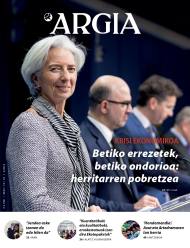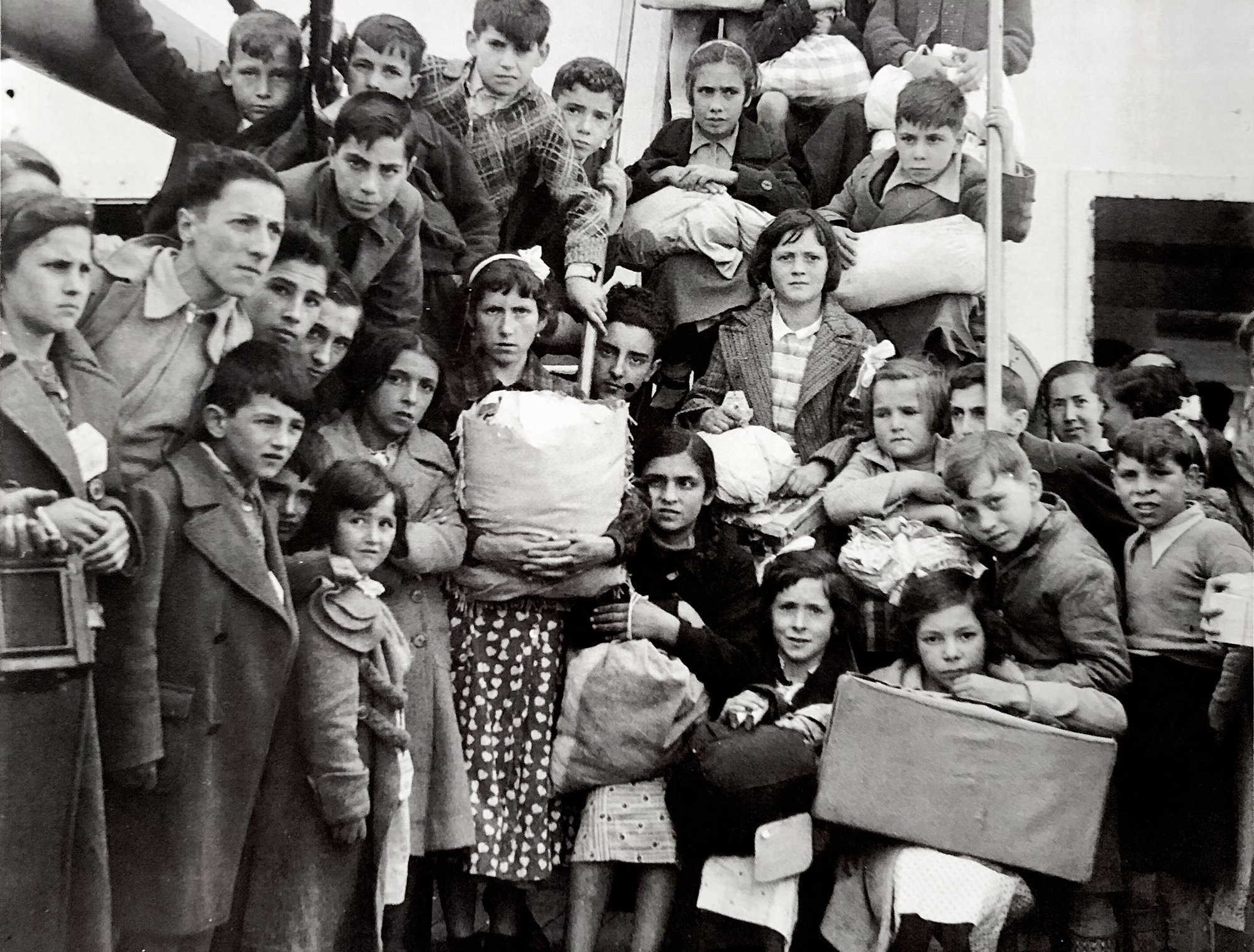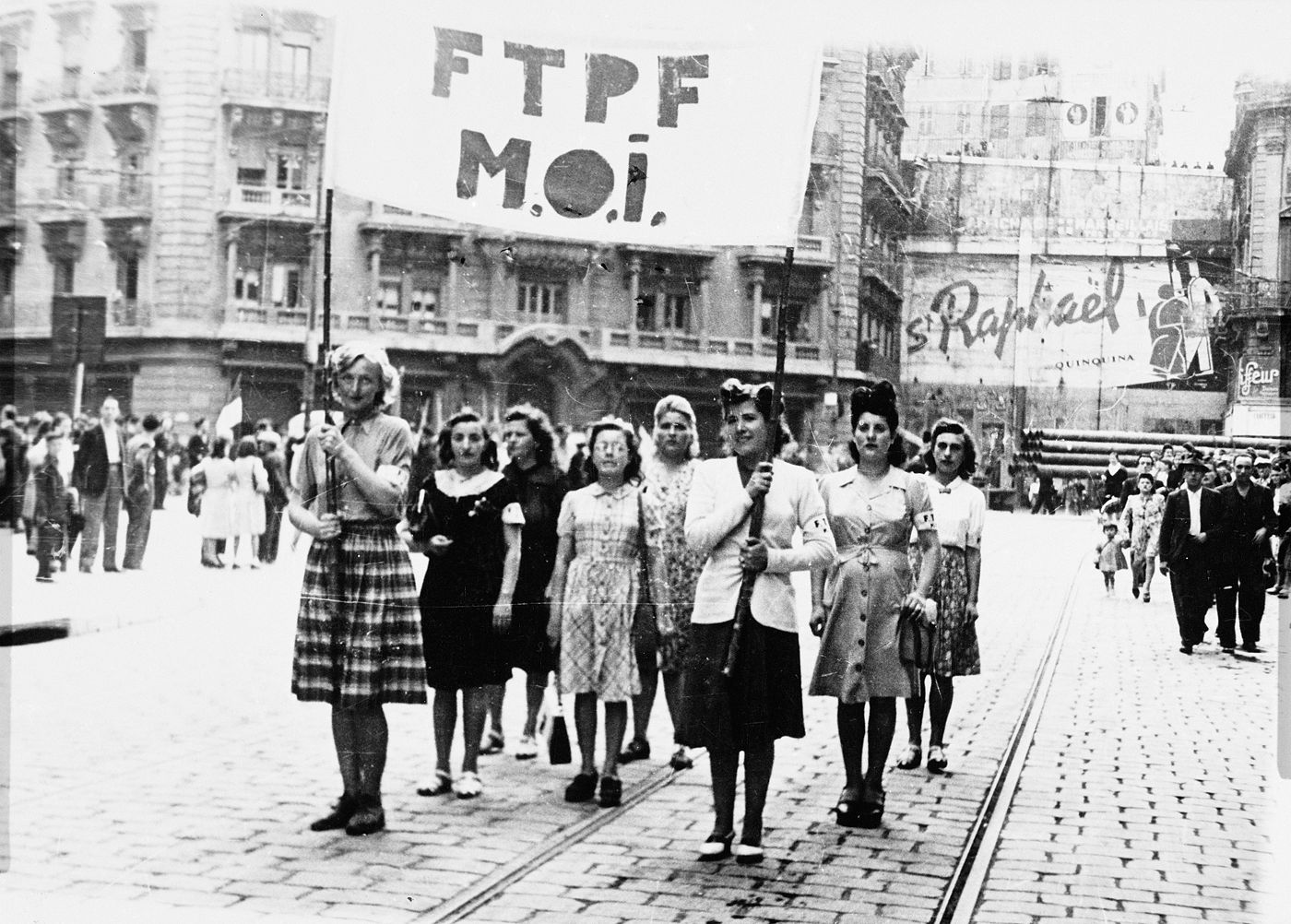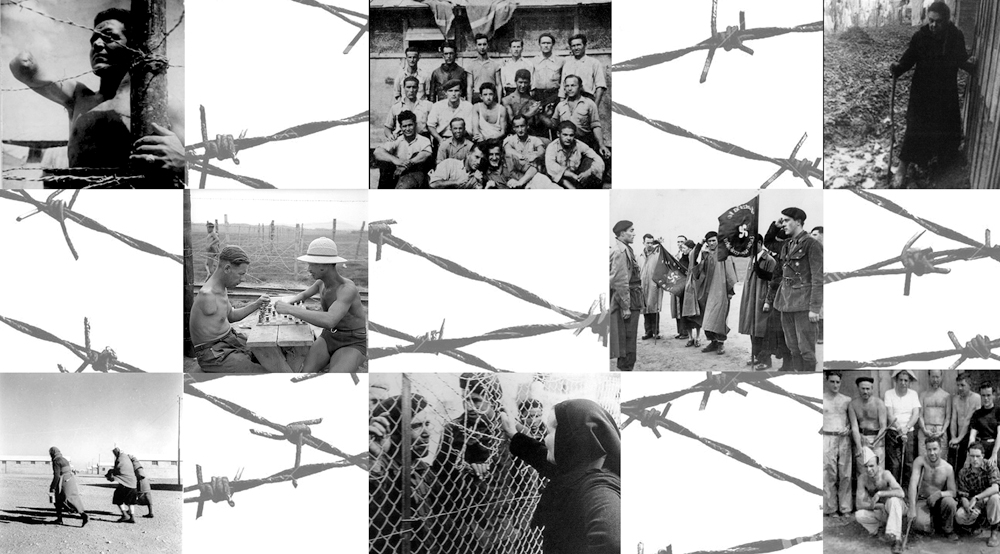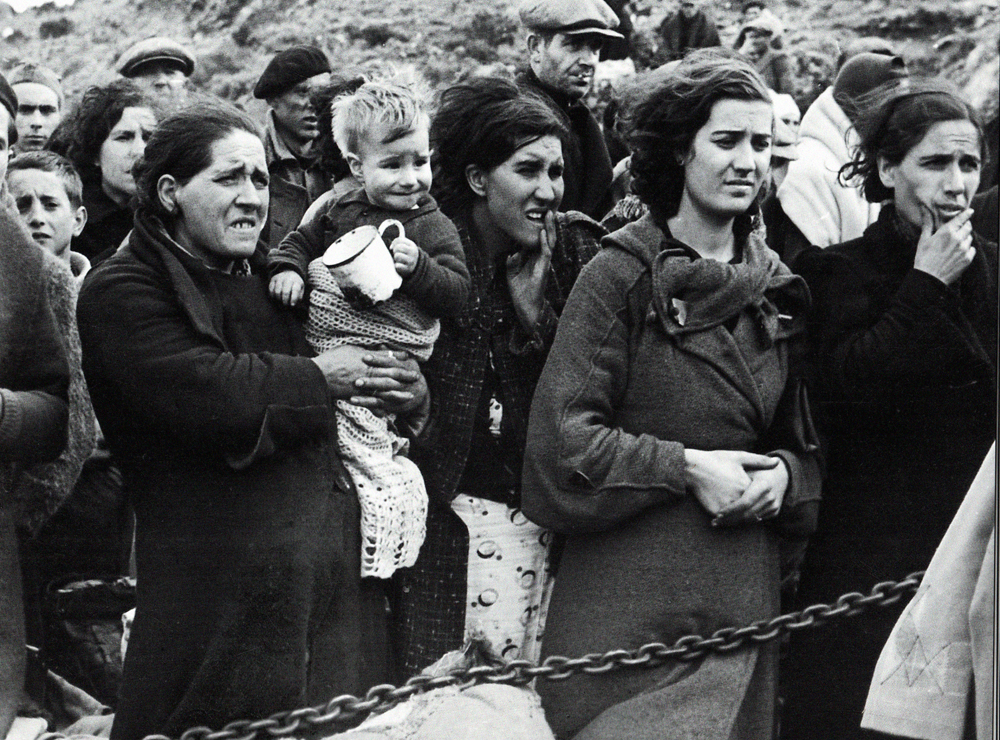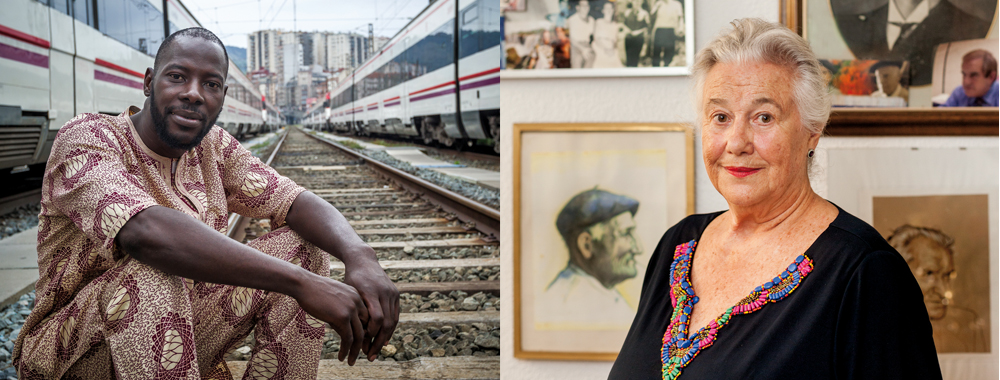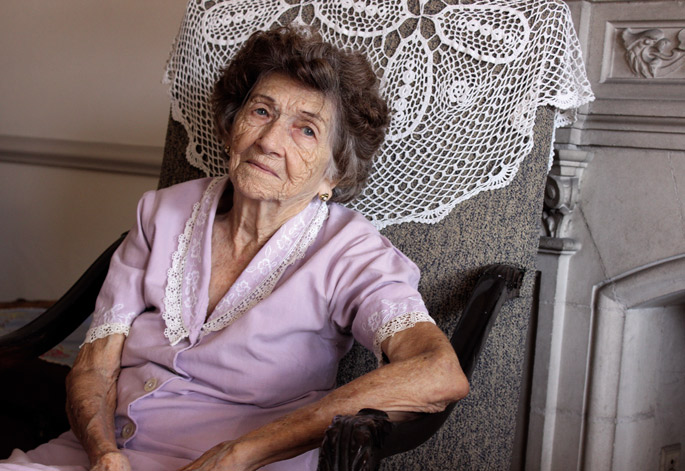"You'll never get 100 percent what you'd like."
- He was President of Eusko Ikaskuntza-Sociedad de Estudios Vascos, Delegate of Foreign Action of the Lehendakari of the Basque Government, Engineer, born and living in exile despite not being a boy of war, Paris-Madrid-San Sebastián road. He tells us that he is the grandson of Miguel Muñoa, who began to speak and founded that first ikastola in Donostia. We've gone back a hundred years to the present day.

Joxe Mari Muñoa Ganuza. Pau, 1942
He is heir to Miguel Muñoa, agent of the first ikastola in San Sebastian. French was exiled by war. He grew up and lived in San Juan de Luz and Paris, and worked as an engineer in exile until his return to Euskal Herria in 1983. He was a delegate of External Relations of the Lehendakari for eighteen years in the Basque Government and president of Eusko Ikaskuntza for three and a half years. He says that he has been happy and that he continues to be so.
[He's started talking before I ask myself]
...I'm so lucky, I'm so happy. When it was time to retire, I thought of two things. One, that retirement was a sunset. And you know, after sunset comes the night. And after night the sun rises. And I, as a believer, believe that I, too, will come the night and then the sun. I also thought that if I want to repent, we all have a lot of reasons for that. In my case, my parents had to be exiled during the civil war, they lost everything they had – and they had a lot – and in my case I have seen and lived hard things, but nevertheless I consider myself lucky.
Are you also a war child?
No, I was born in 1942. Amatxo, Magdalena Ganuza, was exiled in September 1936 before General Mola's troops closed the border with Behobia, taking refuge in Sara at his uncle's house. My grandfather, Marcos Muñoa, lived with his father and his uncle Miguel. Miguel is the one who made the first ikastola in San Sebastian. Juan Muñoa built the Los Angeles College in San Sebastian and the porcelain factory in Bidania, being the Muñoatarras. Later, Puente, head of Falange, took over everything. The story is long… Do you have time?
Ask also...
My great-grandfather was called Marcos Antonio Muñoa. He lived in Bidania, in a small hamlet, in dire need. Around 1820, the safest for hunger, headed to Argentina. There he had an uncle, Iraola, who had made fortune. The great-grandfather married there, not knowing whom, then widowed and returned here at age 60. He arrived in 1860 with a lot of money and bought a house in San Sebastian, a whole house in San Jerónimo Street, 20. He then married a pretty 16-year-old, Manuela Pagadiábal, in Bidania, and decided to destroy the old church, which was now in the cemetery of Bidania, and build a new church in the plaza.
Amazing strengths, that's why!
Very religious, Christians... More Christians than Pope! They had two sons, our grandfather Juan, and his uncle Miguel, founder of the ikastolas. Besides the Euskaldunes, both Juan and Miguel were founders of the Eusko Ikaskuntza and, on the other hand, although ideologically conservative, progressive. For example, a cooperative was set up in Bidania to collect and sell milk from farmhouses. This cooperative was then Gurelesa. In Bidania they left him a whole house, with a symbolic income, a penny a year or something. To them is the opening of the porcelain factory in Bidania, in order to give jobs to the locals, so that they did not have to do what they had to do: Fleeing to Argentina in search of a better life.
He says they were conservative.
The truth is, I didn't know my grandfather John. He died at nine months. In the photos I've always seen my neck clothed, it shows that I was a straight man, that I wouldn't disappoint the daily Mass, not even the Brebiary. I know that the two brothers were tough Christians and knew all the priests, clergy and bishops from there and here. Dear friend, Bishop Mateo Mujika, who spent the summer weeks in the palace of Bidania of our grandparents. That's where the war came.
The Spanish Civil War of 1936.
Uprising. That's the word, the coup, clearly held by fascists and Nazis -- and when the uprising came, grandparents in Bidania, in summer, and I think they didn't know what to do. On the one hand, the Republic, the Reds and this and, on the other, the crusade of Christ… On 13 September Donostia fell and the troops came to Bidania to go from there to Azpeitia. We know the officers slept in the palace. Were they welcome? I don't know. Were they forced? It's possible. The day after the arrival of the troops, the march, the Requetés appeared in Bidania and the two brothers, Juan and Miguel, were imprisoned. Accusation? They were supporters of the PNV, accused – albeit a lie – of belonging to that party and, on the other hand, of lovers of the Basque language. They were taken to Kursaal, to prison, they were fined: the two brothers valued the EUR 30 million this day and our mother, approximately EUR 2 million. The mother did have the PNV card: Magdalena, but Malen, was Ganuza Lardizabal, her grandfather Ignacio Lardizabal Altuna was the first president of GBB.
"I was eighteen years at ease working in the government. I didn't always agree, but it's crazy to think that you absolutely don't have to agree."
Could you pay a fine?
Yes. During their stay in prison, they were able to take various steps. One of his cousins in Argentina, Muñoa, was married to some Pereira. The Hgh-Muñoa family was a very popular and powerful family. They contacted the authorities of the country [Argentina] and sent a message to the Argentine ambassador in Madrid to intervene in favor of the prisoner cousins in San Sebastian, arguing that they were good Catholics and that the Reds would kill them, because they thought they were arrested by Republicans! The truth is that the Madrid ambassador sent the secretary to San Sebastian, and he saw that our grandfather Juan and his brother Miguel were in jail. And in order, he intervened, and John and Michael went free, paying the fine, of course! Subsequently, the Madrid ambassador sent a message to Argentina: “No bad thing they told us to act, if they didn’t smoke them! And a note: Juan and Miguel Muñoa were not imprisoned by the reds, but by Franco’s supporters.” This shows how things looked from the outside at that time, because in many places it was “honest” Franco.
And what life did your family do after leaving jail?
They came directly to San Juan de Luz. Our father Marcos and his brother, Uncle Jesus, traveled to Donibane, where our parents met. They married on 2 October 1937 in Bugllos (France), a small town next to Dax. Monsinore [Clement] Mathieu was the bishop, hazpacho, very euskaltzale, of Dax, who enthusiastically defended the refugees throughout France, as he maintained relations with the cardinals and bishops of the country. Our parents had no financial problems because they had all the heritage they wanted in Argentina. They confiscated their riches, but then they were able to recover them through the courts. But not in time: Grandpa Juan recovered his properties two years after his death.
Was he killed when he recovered?
Yes, then. Juan Muñoa Pagadizabal died in 1943. His brother Miguel, in 1953… As for our parents, they married and settled in Donibane, where my brothers were born, one in 1938 and another in 1939. And then the Second World War and the occupied area of Donibane [Lohizune]! For Basque refugees this was not a safe place, so my family headed to the free zone, Pau, where I was born in 1942. Although we were two families, two Muñoa Ganuza married two sisters, aitatxus and uncle. We were in Pau until the end of the war. So we went back to Donibane. In our house they were convinced that, after winning the World War, Franco was also going to have to leave soon, put in power by the Nazis and fascists. Meanwhile, we, the brothers, started studying at Donibane, which would supposedly be short. I, for example, studied at home, with a young lady here: It was called Julia Esnal. We lived in a beautiful house, we were well…
.jpg)
Years later, they thought about taking Franco's command away.
In 1952, his father saw it clear that Franco was for a while. Meanwhile, the first thing they had to live were our children, our studies. By then, the grandfather had the idea that what his grandfather did in Bidania, the porcelain factory, he set out to do in Hendaia, to create a factory to give jobs to the refugees and the people of Irun. And he did it in 1950. You point. A large factory for three hundred workers. For part time, he had recovered what Franco had withdrawn, and there were still hectares of land and property in Argentina. But then Perón came to power in Argentina and seized all the goods to our house and to his family. In parallel, here the Hendaia factory sank.
That too? Quito Argentina, spot the Hendaia factory…
Our homes may not have much industry experience and, in general, have no experience in France. They could not maintain the factory: they cut off all the sources of income, lost the monetary guarantees – their houses and so on – the Hendaya factory, and the assets of Argentina, which were held by Perón. Dad ran out of nothing. It opened in 1950 and in 1957 there was no factory anymore.
Were they left with nothing?
Nothing. The main concern of parents is that their children should go ahead, but in this situation it was not easy for us. However, as I said, our family had been in contact with all the priests and congregations before the war, which made my brother finish his studies at a Jesuit college next to Paris, where engineering entered the largest school, at the Polytechnic School, founded by Napoleon. I studied at Saint-Marie de Donibane and Saint-Bernard de Baiona schools. In Saint-Bernard, hospitalized but unpaid.
"There had to be four years in Eusko Ikaskuntza, but I was three and a half years: they held a general assembly and kicked me out."
What do you mean?
Prior to the war, my grandfather Juan made Los Angeles College in San Sebastian with those of La Salle, and I contacted our Lasallian families and, as in Baiona they had Saint-Bernard College, I went to the void. Then I also did engineering, but in Grenoble, and I started working in Paris in 1965, where I met my wife, Brigitte. We married in 1971, the same year my grandfather died. My father died in San Sebastian and we married in May. I worked in Paris until in 1974 we went to Madrid. Since we got married, the woman knew we were going to identity or to Basque Country, but there was no form. Working in Paris, finding work here was not easy. However, in 1974 I wrapped my work in a branch of the Parisian company, and in 1983 we came to the Basque Country. By then we had four sons: the eldest daughter was born in Paris; the second, in Aix-en-Provence, next to Marseille, where the factory sent me for a year and a half to start another factory. In the end, the two children were born in Madrid.
What did parents do?
Look for work. Dad and mom were left with nothing and dad was looking for work. In San Sebastian, there was Harmoniphon, a small electrical organ factory. Jabier Mujika was the boss, but with his grandfather's money he took the factory forward and, in trouble, Mujika helped his grandfather sell those organs in Madrid. Our parents went to live there. There they lived, where their father died in 1971. Amatxo stayed there with our sister until in 2003 he moved to San Sebastian.
As he said, in 1983 he returned home, the most well-known stage we know of him began…
I distinguish three times in this arrival. The first is to come to the Basque Country. We came with four children ages 3 to 11. By the end of July, I knew we were going to come here, and the first thing was to educate the children. We tried at some ikastola, but the children did not know Euskera and we did not succeed. We talked to my cousins and they advised us some centers. We went to one of them, we were taught the facilities, the results of the students, and this and that. Wonderful. Beautiful words as you like. In this, I asked who was informing us about the center: “We have a problem: our children do not know Basque. I have always worked from one side to the other, my wife is French, from Burgundy...”. And he: “That’s not a problem, the students here learn Basque, but all they have to do is know something.”
“Nothing to know what?”
Yes. And he said more to me. “Every year students learn the same, calm, the Basque will not be an obstacle.” I then: “Therefore, at the end of high school they will not be able to speak in Basque, right?” “No, then!” “I very much appreciate expressing it clearly, because we come from Madrid for our children to learn well in Basque, for them to live in Basque.” He was surprised. I said more. “If our children had four hours of hole a week, I would require that they be able to speak in Basque at the end of their studies. Thank you and goodbye.” It did.
Speaking of the return, he says he distinguishes three times...
First, I said, come here, let the children learn Basque. The second is the work of the Basque Government on behalf of external relations of the Lehendakari. I didn't know what I could do, but I knew I was going to do everything I could. I mean too much, but I felt I was doing something for my people. I was the first to speak in Basque in an institution of the European Union. I was working in the government for eighteen years. I didn't always agree, but it's crazy to think that in order to do anything, you have to totally agree.
The third stage is when he was president of Eusko Ikaskuntza, right?
Yes, then. Already retired, two people came requesting the presidency of Eusko Ikaskuntza. “You’re perfect,” they said, and I then said: “Say it, don’t you have anyone else? Ja, ja…”. I had great illusions and great disappointment in Eusko Ikaskuntza. I was very excited because it was an organization created by our grandfather and his brother. When I was offered the presidency, Eusko Ikaskuntza was a reality, but also a myth! I entered Eusko Ikaskuntza with great enthusiasm, at a bad time.
Why was it a bad time?
Because 2008 was the time of the economic crisis. Eusko Ikaskuntza grew dramatically over the previous four years. One Euskomedia, another foundation… had 60 workers and, on the other hand, lived through subsidies. It was not possible. There came the crisis and the need to think something. I realized the people were not interested. Some members, especially employees, were interested, among others, in their salary. As for the institutions, the most important subsidy was that of the Spanish government! More than what the government and the three Members gave! I wanted to push for deep reflection, and I thought I had to surround myself with collaborators. And I think I surrounded myself with the four or five most luminous people in the Basque Country: Pako Garmendia, Juan Ramón Gebara, Josu Jon Imaz, Juanjo Alvarez and José Luis de la Cuesta. We met once a month to think about what to do. Very enriching, exciting…
"The three foundations of Eusko Ikaskuntza-Sociedad de Estudios Vascos would be destroyed and, secondly, we would go from 26 to 4 or 5 people in the structure of Eusko Ikaskuntza"
What were the reasons for this profound reflection?
There were 26 workers at Donostia headquarters. To guide the reflection, I took another person, a woman, of great value. But a dirty war emerged. They didn't let him live. She came with cancer. And then they kicked me out. There had to be four years, but I was three and a half years old: they made a general assembly and kicked me out. When you want to say nice things you do not say that, but I tell you raw here: I was kicked out. The shame is that we could not make that thought. And on the other hand, what they did to that woman on our board is inexcusable. It has no name.
He entered the entity in 2008, he was admitted, as he said.
In Basque Country we already had seven universities! So what could we do in Eusko Ikaskuntza, what universities didn't do? The Government was also working. What did we and we have to do? Eusko Ikaskuntza-Sociedad de Estudios Vascos could be a council of state, the council of the Basque State, in which scholars should participate, not those who know a lot, but those who have moral and social authority, so as not to work.
Not to work? Why, then?
Prepare short and in-depth reports at most. What path should Euskal Herria take in order to reflect and make plans. On the four shores of the world, in Japan, in China and in the rest of the world, to think about who can help carry out those plans and design strategies… Eusko Ikaskuntza would not have commanded what this country has to do, but he would have proposed. Some Lehendakari, some Professors, some Rector of the UPV/EHU and others would be present at this hypothetical Council. This work would be done within the structure of Eusko Ikaskuntza. To do this, firstly, the three Eusko Ikaskuntza foundations would be dissolved and, secondly, we would go from 26 to 4 or 5 people in the Eusko Ikaskuntza structure. What did that mean? That not everyone could well see my intention! Ja, ja… Today I see Eusko Ikaskuntza and wonder: “Where is Eusko Ikaskuntza?” And you, when have you heard of Eusko Ikaskuntza?
* * * * * * *
EUSKO IKASKUNTZA “Eusko
Ikaskuntza was the beacon of the Basque Country. When there was no university, Deusto alone, it filled the void. The clearest and most studied people in Euskal Herria went to Eusko Ikaskuntza to complete their work. That was the initial vocation of Eusko Ikaskuntza. Also in 1932, when the statute of autonomy had to be drafted, Eusko Ikaskuntza was commissioned. When I entered, the situation was different, another was the time.”
WHEN IT IS POSSIBLE, WHAT YOU
CAN DO IS “You do what you can and it’s what most fits what you want to do. You'll never get exactly what you'd like. The truth is that I was happy, I was lucky in both the work in Brussels and here. It’s been 15 years since I retired and I still have relationships with some colleagues.”
LAST WORD
“I’ve told
many that they have to write their family’s story. Not necessarily to publish anything, but for the family. In the end, after having said so much to each other, I started writing the story of our family. I have not written secrets, nor have I written commercial papers. I have written where our family comes from, I have collected photos… But I have not yet taught my children”, we are in our flowers sasi / Irrintzi, oihu, ele ta ulu, marmario ta garrasi. / Windhoek, breeze..."
1936ko Gerran milaka haurrek Euskal Herria utzi behar izan zuten faxisten bonbetatik ihes egiteko. Frantzia, Katalunia, Belgika, Erresuma Batua, Sobietar Batasuna eta Amerikako herrialdeetara joandako horien historia jasotzeko zeregin erraldoiari ekin dio Intxorta 1937... [+]
Eta eskuzabal hartu gintuzten hainbat lekutan, adibidez Mexikon eta Britainia Handian (britainiarren kasuan herritarrek, ez ordea gobernuak). 1936ko Gerrak milaka euskaldun behartu zituen erbestera.
Behin edo behin, mezu kriptikoa postontzian: “Emakume bat dago hemengo Asociación Vasco-Navarra de Beneficencia-n, familiako historia interesgarria duena: Concepción Mañaricúa Lezamiz (Durango, 1921), gerrako exiliatua, ja nahiko zaharra”... [+]









